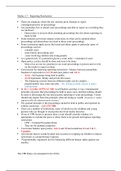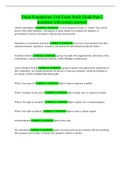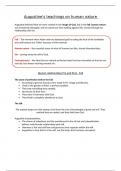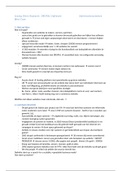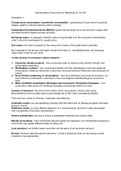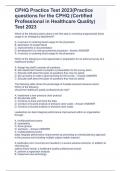There are situations where the law restricts press freedom to report
contemporaneously on proceedings
Are journalists free to attend court proceedings and able to report on everything they
see and hear?
- Open justice is not just about attending proceedings but also about reporting on
them in full.
Some statutory provisions impose restrictions on what can be reported about
proceedings and about those involved in those court proceedings.
Some restrictions apply across the board and others apply to particular types of
proceedings such as:
- criminal cases,
- some family proceedings and
- cases involving children and young people.
As a general rule, if a journalist ignores a court order = contempt of court.
Open justice: justice should be done and seen to be done.
- Most of us are not in a position to see court proceedings in person and we rely
on the media to report on them.
Good reason for imposing reporting restrictions - balance between journalistic
freedom of expression in Art 10 and open justice and Art 6.
- Art 6 - fair hearings being held in public.
- Art 8 arguments: family and private life issues.
- The balancing exercise between different rights can be complex –
proportionality may come into play – EG: looking at public interest or policy
considerations.
In AG v Leveller [1979] AC 440, Lord Diplock said that: it was a fundamental
principle of justice that proceedings be held in open court, and that nothing should
be done to discourage the fair and accurate reporting of court proceedings. Courts
should only depart from this principle when not doing so would “frustrate or render
impracticable the administration of justice”.
The general principle is the proceedings should be held in public and reported on
without restriction – (Art 6 ECHR)
There are a number of restrictions, some of which involve children and young
persons who are thought to need protection from media intrusion.
If one of CPR factors is present, then a court should consider whether it is
appropriate to exclude the press or allow them to be present and impose reporting
restrictions.
- CPR = Criminal Procedure Rules
- They are for guidance purposes
Court must balance open justice, Arts 6 and 10 and sometimes 8 even 2 & 3 –
Venables
All relevant factors would be taken into account in weighing up whether to impose
restrictions is a proportionate response.
Proportionality arguments involve balancing different human rights against one
another.
The CPR Rules (As amended in Oct 2016):
, Part 6 of the Criminal Procedure Rules (“CPR”) deals with court’s
powers in relation to the reporting of and public access to criminal trials.
Rule 6.1 provides that: “This Part applies where a court can –
(a) impose a restriction on -
(i) reporting what takes place at a public hearing, or
(ii) public access to what otherwise would be a public hearing;
(b) vary or remove a reporting or access restriction that is imposed by legislation;
(c) withhold information from the public hearing during a public hearing;
(d) order a trial in private…”
Rule 6.2 says:
“(1) When exercising a power to which this Part applies … the court must have regard to
the importance of –
(a) dealing with criminal cases in public; and
(b) allowing a public hearing to be reported in public.
(2) The court may determine an application or appeal under the Part-
(a) at a hearing, in public or in private; or
(b)without a hearing.
(3) But the court must not exercise a power to which this Part applies unless each party and
any other person directly affected-
(a)is present; or
(b)has had an opportunity –
(i)to attend, or
(ii)to make representations”
Rule 6.4 says court can impose reporting restriction either:
“(2)(a) on application by a party; or (b) on its own initiative.
(3)A party who wants to the court to do so must –
(a) apply as soon as is reasonably practicable;
(b) notify –
(i) each other party and
(ii) such other person… as the court directs.”
CPR also lists statutes allowing reporting restrictions as well as providing for an
inherent jurisdiction in exceptional circumstances.
Underlying themes in the CPR:
Reiterates the principle of open justice.
Courts must notify media in advance of any applications to restrict reporting and
where this is not possible to allow them to make representations soon afterwards.
Reporting restrictions clearly inhibit freedom of expression in Art 10(1) so any
restrictions need to be necessary in a democratic society within Art 10(2).
Types of hearings:
Different types of Hearing to which restrictions might apply:
a. In open court – means hearing is in a courtroom and both the public and the
media are able to attend but the media are necessarily free to report on
everything because reporting restrictions can be imposed in certain
circumstances.
b. In private - means that the hearing is not open to the public, only the parties –
EG: national security / terrorism or could involve children
c. In chambers - tends to refer to a hearing held behind closed doors usually in a
room not open to public – EG: bail hearings or in civil proceedings to discuss
technical issues relating to procedure. There is no reason to exclude the media and
the public unless what is being discussed falls within the CPR.

